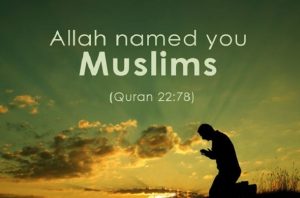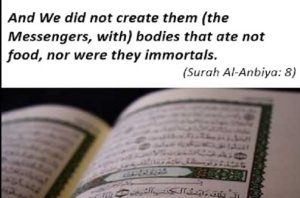By Sheikh Ahmad Kuftaro, The late Grand Mufti of Syria
“O People of Faith!” This address is a continuation of a long history of dialogue among the people of revealed religions. Allah has favored them with His solicitude and granted them guidance through the light of His remembrance, thus uniting them as members of one family and spreading through them all good and mercy.
Though there were prophets before Abraham, it was the will of Allah that the later generation of prophets be his offspring. For that reason, Abraham became the friend of Allah and a spiritual symbol around whom the people of faith flocked.
The great succession of these prophets after Abraham called for the message of Allah, each paving the way for the next one, in accordance with Allah’s divine decree. Thus, at each stage of human history no group of people were left without divine instruction.
Prophet Muhammad (peace be upon him) explained his mission in the following words:
“The comparison between me and the preceding prophets is similar to a group of people who took part in building a house and completed it but for an empty space for one block or brick. Onlookers admired it and said in astonishment, ‘What a beautiful mansion, if it were not for the place of the missing brick.’ I have been this brick and I am the last or the seal of the prophets.” (Al-Bukhari)
Muhammad then emphasized, “I am only one brick of it.”
In this analogy the Prophet does not refer to himself as the whole house but as a part of this structure of prophethood.
Thus, he draws the attention of his nation and the followers of previous prophets to the essential fact that the true glory of the people of faith can come only through cooperation and integration. As if to confirm this, Allah says in the Qur’an:
Verily, your community of religion is one community, and I am your Only Lord and Cherisher. Therefore serve Me (and no other). (Al-Anbiya’ 21:92)
Exemplars for Humanity
Islam does not identify itself with a single person or race, but rather with recognition of and submission to Allah. Thus, mere faith in Muhammad does not suffice. Islam demands belief in the great caravan of prophets, of which Abraham is the vanguard.
His offspring include Isaac, Ishmael, Jacob, Joseph, David, Solomon, Moses, Jesus, and Muhammad (peace be upon them all). They are the teachers and examples to humanity, and their spiritual stations were assigned solely by Allah.
Thus, to attribute sinful behavior to any of them, which even ordinary people would be ashamed of committing, would be to question the wisdom of Allah in choosing such people. Hence, Islam emphatically maintains the high moral and ethical status of such men.
Furthermore, to deny or reject any of the prophets would be to abandon faith. Hence, preserving the integrity of prophethood and its lineage paves the way for cooperation of the people of faith. The Qur’an says:
Praise be to Allah, the Cherisher and Sustainer of the worlds. (Al-Fatiha 1:2)
Allah does not identify Himself solely with the Muslims, the Arabs, or the Semitic tribes. He is the Lord of the Worlds. Therefore, whoever turns to Allah in love and worship understands that there are other people of faith with whom he has to cooperate in order to fulfill the objectives of Allah and abide by His commands. In this connection, Allah not only counsels humans about their good behavior toward others, but cautions them as well:
Say to My servants that they should say (only) those things that are best, for Satan sows dissensions among them, and Satan is to man an avowed enemy. (Al-Israa’ 17:53)
Their Father
Muslim scholars of the Qur’an say that linguistically the name Abraham means “a compassionate father”. This corresponds with the meaning found in most of the Semitic languages at that time. There is undoubtedly a direct relationship between his name and the great message for which Abraham was chosen, namely his responsibility for the universal call to Allah.
For his part, Prophet Muhammad is ordered in the Qur’an:
Say, My Lord has guided me to a straight path, to an upright religion, to the Path of Abraham, the true in faith, who was no idolater. (Al-An`am 6:161)
It is very wise that the Children of Abraham should call each other to a mutual encounter. In so doing, it brings them together and creates mutual love and affection within their hearts. Together they form the majority of the earth’s inhabitants, and so the harmony caused by such a union creates the nucleus for global harmony.
The One Message/Belief
The Children of Abraham are joined by the belief in the Oneness of God. Although the direction faced in prayer may differ among Abrahamic religions, this remains but a physical demarcation. The essential direction of the heart remains one, the direction toward Allah.
The Qur’an says that Abraham, after destroying the stone idols of his people in Babylon, said:
For me, I have set my face firmly and truly toward Him Who created the heavens and the earth, and never shall I give partners to Allah. (Al-An`am 6:79)
This very same supplication is repeated by the Muslims each time they pray. They also acknowledge the two great commandments given in Matthew:
“Jesus said to him, you shall love your Lord, your God, with all your heart, and with all your soul, and with all your mind. This is the first and greatest commandment. And the second is like it: you shall love your neighbor as yourself. On these two commandments hang all the law and the prophets.” (Matthew 22, verses 37-40)
The Children of Abraham also believe in the same prophets, whose lives are examples to follow. The Qur’an stresses this when it says:
We sent you Inspiration to know Our will as We sent it to Noah and the Messengers after him. We sent Inspiration to Abraham, and Ishmael, Isaac, Jacob (Yakub) and the Tribes, to Jesus, Job (Ayub), Jonah (Yunus), Aaron (Haroun), and Solomon, and to David We gave the Psalms. Of some Messengers We have already told you (and Moses was addressed directly), but there are others of whom We have not yet spoken. (An-Nisaa’ 4:163-164)
All Prophets
Also in the possession of the Children of Abraham are books given to them by Allah for the guidance of their people. These revealed books enjoin the same virtues and ban the same vices. The Qur’an says:
There is guidance and light in the Torah, which We have revealed. Following its standards, the Jews have been judged by the prophets, who bowed (as in Islam) to God’s Will, by the rabbis, and by the doctors of law. (Al-Ma’idah 5:44)
The Qur’an also says:
Let the people of the Gospel judge by what Allah has revealed in it. (Al-Ma’idah 5:47)
The children of Abraham hold various tenets in common: they believe in Allah and His angels, and in His books and messengers. They also believe in the Day of Judgment. The Qur’an says:
Those who believe (in the Qur’an), and those who follow the Jewish (Scriptures), and the Christians and the Sabeans, any who believe in Allah, and the Last Day, and work righteousness, shall have their reward with their Lord. They have nothing to fear or regret. (Al Baqarah 2:62)
To be continued
_________________________
Source: islamic-study.org
[ica_orginalurl]

















